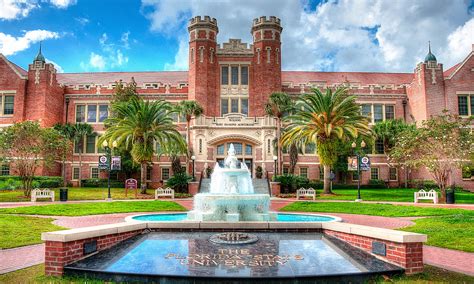Pursuing higher education opens doors to a world of opportunities, but navigating the labyrinthine world of college admissions can be daunting. For students who may face academic or financial challenges, finding colleges with accessible admissions criteria is paramount. Florida boasts an array of institutions that prioritize accessibility, offering a welcoming and supportive learning environment for students from all backgrounds.

Florida’s open-admissions colleges are committed to providing access to higher education for all students, regardless of their academic record. These institutions believe that every student has the potential to succeed in college with the right support and resources.
According to the Florida Department of Education, 28 public colleges and universities in the state operate under open-admissions policies. This means that any student who has a high school diploma or equivalent (e.g., GED) is eligible for admission to these institutions.
| College | Location |
|---|---|
| Broward College | Davie |
| Central Florida State College | Ocala |
| Chipola College | Marianna |
| Daytona State College | Daytona Beach |
| Edison College | Fort Myers |
| Florida Gateway College | Lake City |
| Florida SouthWestern State College | Fort Myers |
| Gulf Coast State College | Panama City |
| Hillsborough Community College | Tampa |
| Indian River State College | Fort Pierce |
| Lake-Sumter State College | Leesburg |
| Miami Dade College | Miami |
| North Florida Community College | Madison |
| Northwest Florida State College | Niceville |
| Palm Beach State College | Lake Worth |
| Pasco-Hernando State College | Dade City |
| Pensacola State College | Pensacola |
| Polk State College | Lakeland |
| Santa Fe College | Gainesville |
| Seminole State College | Sanford |
| South Florida State College | Avon Park |
| St. Johns River State College | Palatka |
| St. Petersburg College | St. Petersburg |
| Tallahassee Community College | Tallahassee |
| Valencia College | Orlando |
Accessible Admissions: Open-admissions colleges eliminate the stress of competitive admissions processes. Students with varying academic backgrounds and GPAs can apply with confidence, knowing that they will be given a fair chance to succeed in college.
Affordable Education: Open-admissions colleges often have lower tuition rates than more selective institutions. This makes higher education more financially accessible for students and families from all income levels.
Supportive Environment: Open-admissions colleges understand that students need a supportive environment to thrive academically. They provide a range of student services, such as tutoring, counseling, and academic advising, to help students reach their full potential.
Flexibility and Transferability: Open-admissions colleges offer a flexible learning environment that caters to the needs of working adults, part-time students, and those seeking to transfer to a four-year institution. Many courses are available online or at night to accommodate students with busy schedules.
While open-admissions colleges offer a welcoming environment, there are some common mistakes that students should avoid when applying to these institutions:
- Not applying early: Open-admission colleges typically have rolling admissions, but it’s always a good idea to apply early to avoid any potential delays in processing your application.
- Not meeting the minimum requirements: Although open-admissions colleges accept all eligible students, they still have minimum requirements for high school grades and GPA. Be sure to check the specific requirements of your target college before applying.
- Not taking advantage of available resources: Open-admissions colleges provide a wealth of support services to their students. Take advantage of these resources, such as tutoring, counseling, and academic advising, to increase your chances of success.
- Not considering financial aid: Open-admissions colleges may offer financial aid packages to eligible students. Be sure to explore all options for financial aid, including grants, scholarships, and loans.
1. Are open-admissions colleges less rigorous than traditional colleges?
Open-admissions colleges do not lower academic standards for their students. They provide a supportive learning environment that allows students to succeed at their own pace.
2. What types of degrees do open-admissions colleges offer?
Open-admissions colleges offer a wide range of associate’s degrees, bachelor’s degrees, and technical certificates.
3. Are graduates from open-admissions colleges able to transfer to four-year institutions?
Yes, graduates from open-admissions colleges can transfer to four-year institutions. Many open-admissions colleges have articulation agreements with four-year institutions that make it easy for students to transfer their credits.
4. What is the cost of attending an open-admissions college?
The cost of attending an open-admissions college varies depending on the institution and the type of degree pursued. However, open-admissions colleges typically have lower tuition rates than more selective institutions.
5. How can I apply to an open-admissions college?
You can apply to an open-admissions college by completing an online application or submitting a paper application. Be sure to check the specific application requirements of your target college.
6. What is the deadline to apply to an open-admissions college?
Open-admissions colleges typically have rolling admissions, which means that applications are processed as they are received. However, it’s always a good idea to apply early to avoid any potential delays in processing your application.
7. What happens after I submit my application?
Once you submit your application, it will be reviewed by the admissions office. If you meet the minimum requirements for admission, you will be accepted into the college. You may need to submit additional documents, such as transcripts or proof of financial aid, before you can officially enroll.
8. What if I have questions about the application process?
If you have questions about the application process, you can contact the admissions office of your target college. The admissions staff can answer any questions you have and help you through the process.
